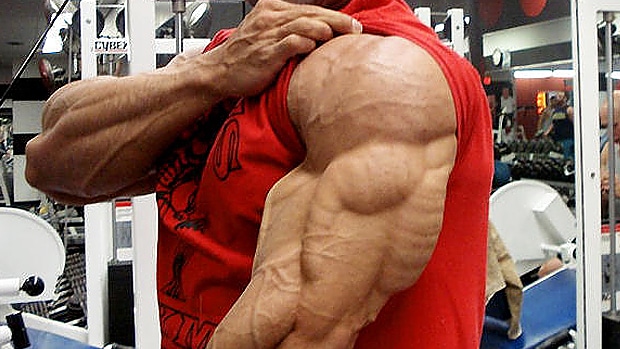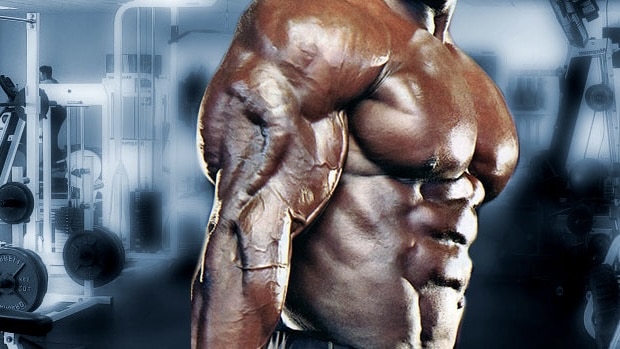The cable tricep extension is an important exercise for any arm day!
Cable tricep extension, also known as the straight bar tricep pushdown, is one of the most common and effective tricep exercises. It is also one of the first exercises people learn to perform when they join a gym, but still, most people leave gains on the table while performing the lift.
With this article, we are going to dive deep and help you make the most of the exercise.
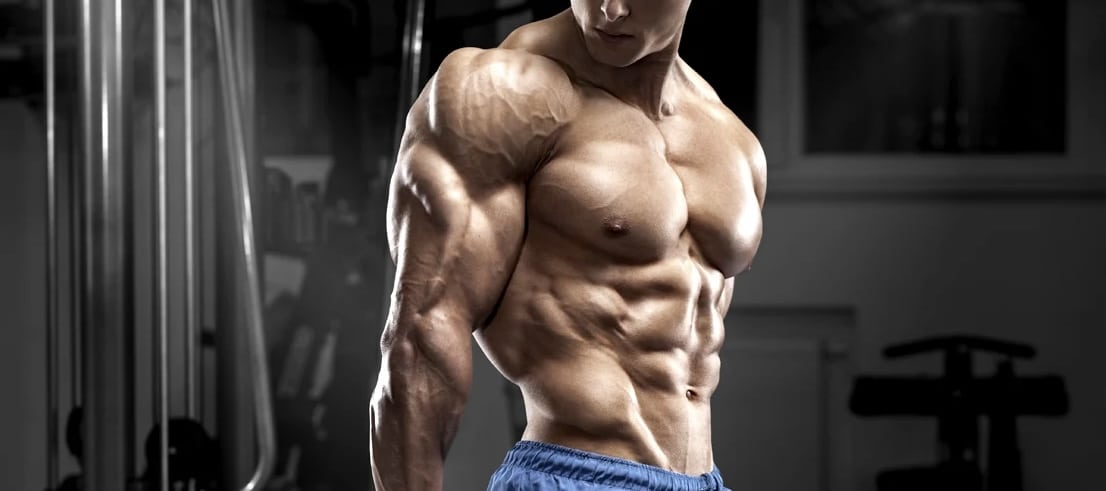
Cable Tricep Extension – Introduction
Chest striations and visible abs are cool, but nothing says badass like a pair of sleeve-ripping horseshoe triceps. It is no secret that biceps are one of the most-loved muscle groups. However, triceps do not get as much love as their siblings.
The reason behind the step-motherly treatment with the triceps? The bicep flex is a much easier pose to strike compared to the side chest that puts your triceps on display in their full glory.
Not focusing on the triceps is one of the most common rookie mistakes, especially if you are into bodybuilding.
Bodybuilding is a game of illusions. The bodybuilders you see on the Olympia stage are not as big as they appear on camera. Okay, Big Ramy is actually a giant, but we hope you get the point we are trying to make here.
Bodybuilders with small joints and waists, full muscle bellies, and perfect muscle symmetry look larger than life. Muscle proportionality plays a vital role in this sorcery.
Coming back to the triceps, if you lay an equal emphasis on your triceps as you do on your pythons, your arms will look bigger and more defined. And yes, you would turn heads with your front double bicep pose.
Side note: You seriously need to get over your bicep obsession.
Check Out: Best on the Planet – Triceps That Need Horseshoes of Their Own
Benefits of Cable Tricep Extension Exercise
Adding the cable tricep extension to your exercise arsenal has the following benefits:
1. Convenient and Effective in Building Muscle Mass
If you are anything like most lifters, you probably start most of your tricep workouts with the cable tricep extension. This exercise is a great way to pump your horseshoes and flush them with lactic acid at the beginning of your workout.
Besides, would you ever perform an exercise if it did not help you put on muscle mass? Oh wait, we completely forgot about the CrossFitters for a second, our bad.
2. Improves Conditioning
Compound exercises like barbell row and deadlift involve multiple muscle groups and are great for building strength and muscle mass but do little to improve your muscle conditioning.
However, since the cable tricep extension is an isolation (single-joint) lift, it helps you focus on a single muscle group at a time. While performing the cable pushdown, your goal should be to pump your triceps with blood and lactic acid and take your muscles beyond the point of exhaustion.
Doing a higher number of reps with controlled rep tempos can help you improve the conditioning of your triceps.
3. Improves Your Performance on Pressing Movements
Your triceps are responsible for elbow extension and elbow/shoulder/wrist stability in the extended position. These are key factors for a strong lockout in Olympic lifts like bench press, overhead press, snatch, clean and press, etc.
Not only this, but stronger triceps can also help you perform bodyweight exercises like push-ups and dips.
4. Offers Numerous Variations
The cable tricep extension or tricep press-down is a versatile exercise and offers the option of adding variety to your workouts by using one of the many variations it offers.
Must Read: Have Non-Existent Triceps? Use These Horseshoe Building Tricks
Muscles Worked While Performing the Cable Tricep Extension
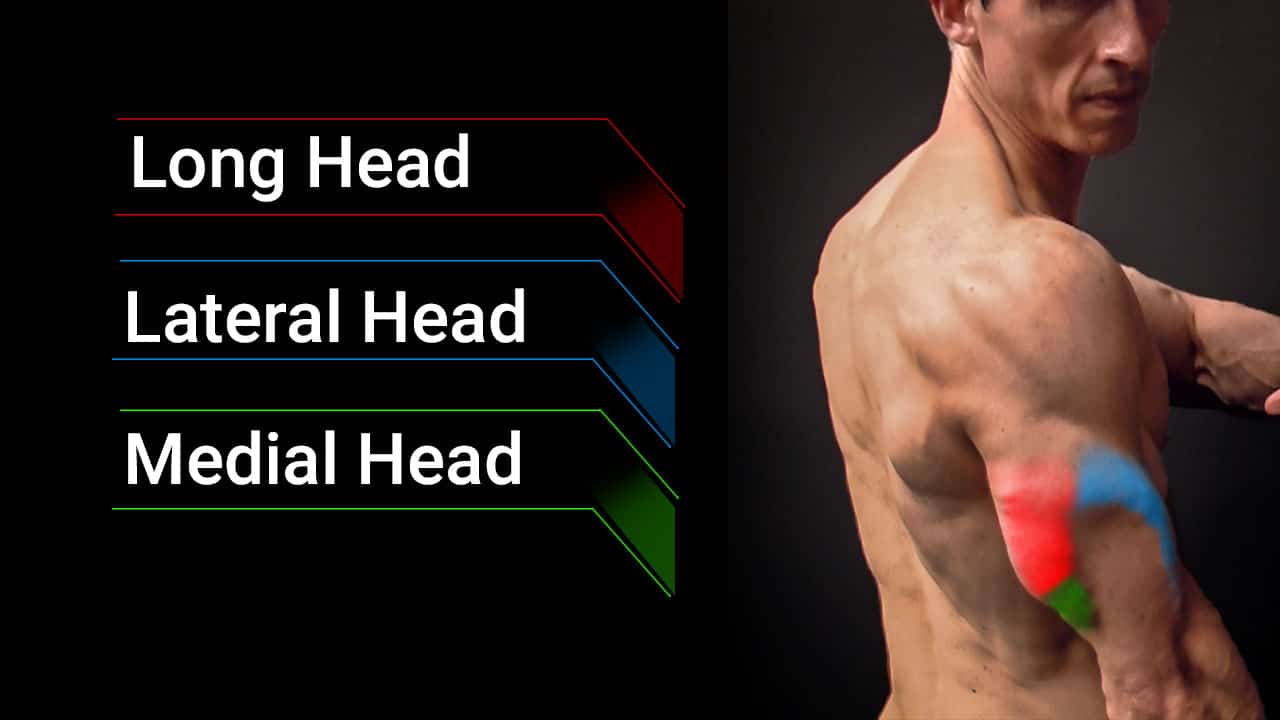
When you extend your arm, the long, lateral, and medial heads of the tricep move together. It is also the reason why it is called tricep brachii. The literal translation for the same is “three-headed muscles of the arm.”
However, while performing the cable tricep extension (straight bar tricep pushdown), you are only working the medial and lateral heads of your tricep.
How To Perform Cable Tricep Extension
Follow these steps to perform the cable tricep extension correctly:
- Attach a straight bar to a cable pulley set at the highest setting.
- Stand at an arm’s length from the pulley.
- Grab the straight bar with a pronated (palms facing the floor) grip.
- Lean forward slightly by hinging at your hips.
- Without using momentum, initiate the movement by extending your elbows.
- Push down the handle until your elbows are almost locked out.
- Squeeze the life out of your triceps at the bottom of the movement.
- Return to the starting position with a slow and controlled motion.
- Repeat for recommended reps.
Related: Chest Dips Vs. Triceps Dips: What’s The Real Difference?
Common Mistakes While Performing Cable Tricep Extension
Most people leave gains on the table while performing this exercise due to their incorrect form. The cable tricep extension might look like a walk in the part, but it can drain you out if done correctly. Here are the most common mistakes people commit while doing the lift:
1. Locking Out Elbows
While performing the cable tricep extension, you need to maintain constant tension on your triceps, and you can only do that if you do not lock out your elbows at the top or bottom of the movement.
Some lifters use the excuse (see what we did there?) that they lock out their elbows to get a proper tricep contraction. While in reality, they just lock out to give their triceps a few extra seconds of rest.
2. Position of Your Elbows
If you did not realize it yet, elbows are where the magic happens in the tricep press-downs. Make sure you are not flaring out your elbows while performing the exercise.
Keeping your elbows pinned to your sides will help you direct all the tension towards the medial and lateral tricep heads. However, letting your elbows flare takes off the tension from the target muscles and puts it on the long tricep head.
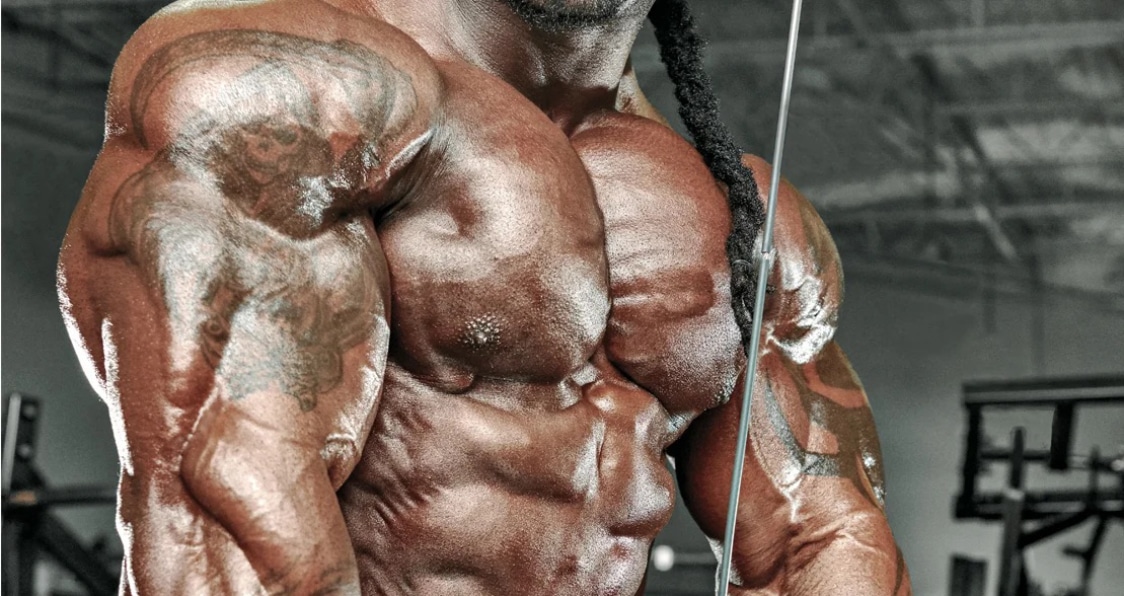
3. Leaning Forward Too Much
The position of your torso plays a vital role in cable tricep extensions. How much you lean while performing the exercise can determine the effectiveness of your set.
While some lifters stand upright while performing the exercise, the others maintain a 45-degree angle with the floor. Both these techniques are sub-optimal.
While performing the cable tricep press-down, your upper body should be at a 60-degree angle with the floor. This position gives you enough leverage to lift heavy without engaging secondary muscle groups.
4. Rounding Your Back
Rounding your back while performing the lift gives you an edge. It puts you in a position to lift heavier. At any point during the exercise, if you feel that you have rounded shoulders and you are leaning over the bar, it is a sign that you are ego lifting.
Lifting with a rounded back takes off the tension from your triceps and puts it on your shoulders. Your shoulder blades should be retracted throughout the exercise.
Related: Top 12 Triceps Building Exercises
Variations
The pulley machine gives you the freedom to use a variety of extensions for this exercise. Some variations of the cable tricep extension include:
1. Rope Pushdown
Rope pushdown is probably the most famous variation of the tricep pushdown. The rope extension allows a higher degree of tricep recruitment as you can spread the rope handles apart at the bottom of the movement.
Steps:
- Attach a double rope handle to a cable pulley machine set at the highest notch.
- Face the pulley and stand at arm’s length from the machine.
- Pin your elbows to your sides and grab the ropes with a neutral grip.
- Push down the rope explosively and spread the handles apart at the bottom.
- Pause and contract at this position for a couple of seconds.
- Slowly return to the starting position.
- Repeat for reps.
2. Overhead Tricep Extension
Overhead tricep exercises like the overhead cable tricep extension primarily target the long tricep head. You could perform this exercise with a straight bar, rope, or V-bar attachment. For the sake of this example, we are going to use a V-bar.
Steps:
- Attach a V-bar attachment and set the pulley around hip level.
- Stand at an arm’s length from the pulley.
- Grab the V-bar with an overhand grip.
- In one swift motion, turn your body away from the cable station and place your arms behind your head so that your elbows are bent, and your triceps are stretched.
- Keep your elbows close to your head throughout the exercise.
- Lift the weight by extending your elbows.
- Pause and contract your triceps at the top of the movement.
- Return to the starting position with a slow and controlled motion. In the pulley exercises, the eccentric movement is as important as the concentric. Focus on contracting your triceps as you return to the starting position.
- Repeat for recommended repetitions.
Must Read: THE NATURAL WAY TO FIX YOUR PROBLEM AREA: TRICEPS
3. Skull Crusher
Skull crushers aka head smackers are one of the most brutal tricep exercises. Your triceps will be begging for mercy by the time you are done with this exercise.
Tip: If you are a beginner, you should not perform this exercise without a spotter.
Steps:
- Sit on a flat bench with an EZ bar placed on your thighs.
- As you lie down on the bench, thrust the bar to your chest.
- Press the bar so that your arms are extended straight over your chest and are perpendicular to the floor.
- While keeping your elbows fixed at this position, slowly lower the bar towards your forehead by bending at your elbows.
- At the bottom of the movement, the bar should be a few inches off your forehead.
- You could also increase your range of motion by lowering the bar behind your head.
- Pause and push the bar explosively to the starting position.
- Pause and contract your triceps at the top for a couple of seconds.
- Repeat for recommended res.
4. Reverse-Grip Tricep Pushdown
The reverse grip tricep push-down is an incredibly effective cable tricep extension alternative. Although this is a push-down exercise, it primarily focuses on the medial and long tricep heads.
Steps:
- Attach a straight bar to a cable pulley set at the highest setting.
- Stand at an arm’s length from the pulley.
- Grab the straight bar with a supinated (palms facing upwards) grip.
- Lean forward slightly by hinging at your hips.
- Without using momentum, initiate the movement by extending your elbows.
- Pause and contract your triceps at the bottom.
- Slowly return to the starting position with a slow and controlled motion while focusing on your triceps.
- The movement should look like a strict bicep curl but in reverse.
- Repeat for recommended reps.
Many lifters make the mistake of lifting too heavy in this exercise. Contracting at the bottom is the key to optimal tricep recruitment in this exercise.
Make sure you have a solid grip throughout the exercise. Keep your wrists and forearms in a straight line and locked. Do not curl your wrists while performing the movement.
5. Dumbbell Tricep Kickback
Dumbbell tricep kickbacks are a great exercise to isolate your medial and lateral tricep heads. Most people leave gains on the table while performing this lift by lifting heavier than they should.
Steps:
- Hold a dumbbell in each hand with your palms facing in toward each other.
- While keeping your knees bent slightly, engage your core and maintain a straight spine as you hinge forward at the waist, bringing your torso almost parallel to the floor.
- Pin your elbows to your sides.
- Keep your head in line with your spine and tuck your chin in slightly. Imagine holding an egg under your chin.
- Push the dumbbell back explosively by straightening your elbows.
- Pause and contract your triceps at the top.
- Slowly return to the starting position.
- Repeat for recommended reps.
Next Read: The Best Cable Exercises For Your Triceps
Wrapping It Up
Cable tricep extensions can open the doors to ultimate horseshoe gains. Now that you have all the tools you need to turn your twigs into venomous pythons, you need to ensure you are not half-assing your way through your workouts.
Focus on establishing a mind-muscle connection, perform the exercises with perfect form, channel the power of visualization, and soon enough, it will look like a horse kicked you in the back of your arm. Good luck!
Which is your favorite tricep exercise? Let us know in the comments below. Also, be sure to follow Generation Iron on Facebook and Twitter.

